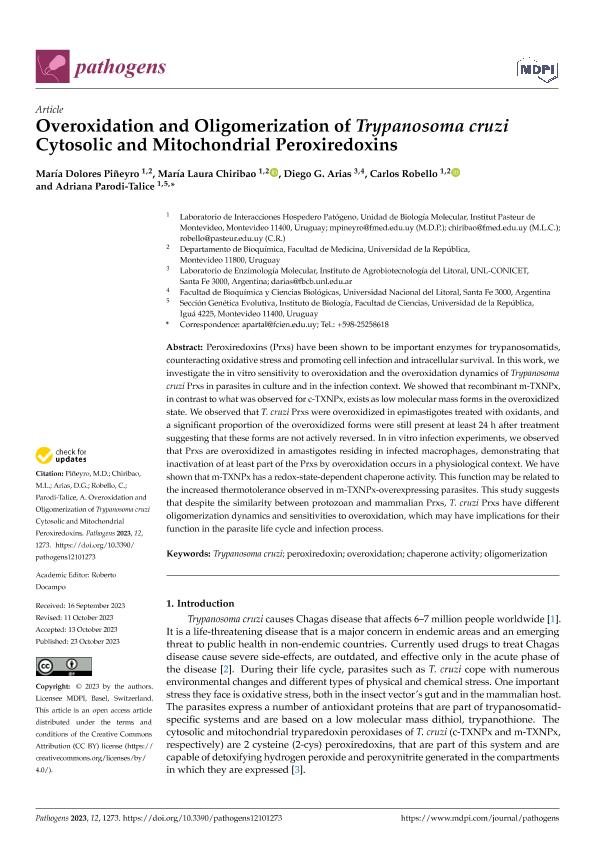Mostrar el registro sencillo del ítem
dc.contributor.author
Piñeyro, María Dolores

dc.contributor.author
Chiribao, María Laura
dc.contributor.author
Arias, Diego Gustavo

dc.contributor.author
Robello, Carlos
dc.contributor.author
Parodi Talice, Adriana
dc.date.available
2024-02-05T13:07:09Z
dc.date.issued
2023-10
dc.identifier.citation
Piñeyro, María Dolores; Chiribao, María Laura; Arias, Diego Gustavo; Robello, Carlos; Parodi Talice, Adriana; Overoxidation and Oligomerization of Trypanosoma cruzi Cytosolic and Mitochondrial Peroxiredoxins; Multidisciplinary Digital Publishing Institute; Pathogens; 12; 10; 10-2023; 1-21
dc.identifier.issn
2076-0817
dc.identifier.uri
http://hdl.handle.net/11336/225740
dc.description.abstract
Peroxiredoxins (Prxs) have been shown to be important enzymes for trypanosomatids, counteracting oxidative stress and promoting cell infection and intracellular survival. In this work, we investigate the in vitro sensitivity to overoxidation and the overoxidation dynamics of Trypanosoma cruzi Prxs in parasites in culture and in the infection context. We showed that recombinant m-TXNPx, in contrast to what was observed for c-TXNPx, exists as low molecular mass forms in the overoxidized state. We observed that T. cruzi Prxs were overoxidized in epimastigotes treated with oxidants, and a significant proportion of the overoxidized forms were still present at least 24 h after treatment suggesting that these forms are not actively reversed. In in vitro infection experiments, we observed that Prxs are overoxidized in amastigotes residing in infected macrophages, demonstrating that inactivation of at least part of the Prxs by overoxidation occurs in a physiological context. We have shown that m-TXNPx has a redox-state-dependent chaperone activity. This function may be related to the increased thermotolerance observed in m-TXNPx-overexpressing parasites. This study suggests that despite the similarity between protozoan and mammalian Prxs, T. cruzi Prxs have different oligomerization dynamics and sensitivities to overoxidation, which may have implications for their function in the parasite life cycle and infection process.
dc.format
application/pdf
dc.language.iso
eng
dc.publisher
Multidisciplinary Digital Publishing Institute
dc.rights
info:eu-repo/semantics/openAccess
dc.rights.uri
https://creativecommons.org/licenses/by/2.5/ar/
dc.subject
CHAPERONE ACTIVITY
dc.subject
OLIGOMERIZATION
dc.subject
OVEROXIDATION
dc.subject
PEROXIREDOXIN
dc.subject
TRYPANOSOMA CRUZI
dc.subject.classification
Bioquímica y Biología Molecular

dc.subject.classification
Ciencias Biológicas

dc.subject.classification
CIENCIAS NATURALES Y EXACTAS

dc.title
Overoxidation and Oligomerization of Trypanosoma cruzi Cytosolic and Mitochondrial Peroxiredoxins
dc.type
info:eu-repo/semantics/article
dc.type
info:ar-repo/semantics/artículo
dc.type
info:eu-repo/semantics/publishedVersion
dc.date.updated
2024-02-02T15:50:43Z
dc.journal.volume
12
dc.journal.number
10
dc.journal.pagination
1-21
dc.journal.pais
Suiza

dc.description.fil
Fil: Piñeyro, María Dolores. Instituto Pasteur de Montevideo; Uruguay
dc.description.fil
Fil: Chiribao, María Laura. Instituto Pasteur de Montevideo; Uruguay
dc.description.fil
Fil: Arias, Diego Gustavo. Consejo Nacional de Investigaciones Científicas y Técnicas. Centro Científico Tecnológico Conicet - Santa Fe. Instituto de Agrobiotecnología del Litoral. Universidad Nacional del Litoral. Instituto de Agrobiotecnología del Litoral; Argentina
dc.description.fil
Fil: Robello, Carlos. Instituto Pasteur de Montevideo; Uruguay
dc.description.fil
Fil: Parodi Talice, Adriana. Instituto Pasteur de Montevideo; Uruguay
dc.journal.title
Pathogens
dc.relation.alternativeid
info:eu-repo/semantics/altIdentifier/url/https://www.mdpi.com/2076-0817/12/10/1273
dc.relation.alternativeid
info:eu-repo/semantics/altIdentifier/doi/http://dx.doi.org/10.3390/pathogens12101273
Archivos asociados
